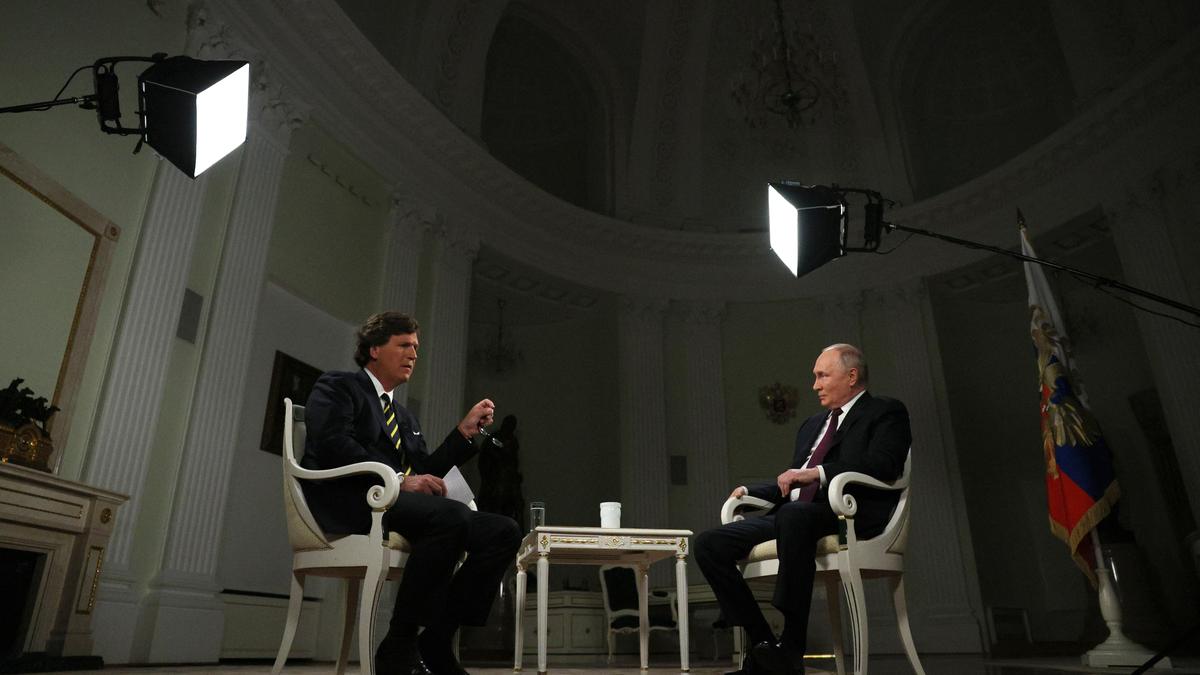
Leonid Gozman
Russian opposition politician
What was the real purpose of former Fox News star Tucker Carlson’s interview with Vladimir Putin last week?
It’s possible the trip was a diplomatic mission. Carlson is a close ally of Donald Trump and the former president’s possible return to the White House could earn him a senior role in his administration, and perhaps even the vice presidency. The interview also presented an opportunity for conveying a message from one leader to another.
For the Kremlin the visit was principally a useful demonstration that Russia is no longer entirely isolated from the rest of the world. However, it was the attempt to influence how American voters view the war in Ukraine that was its primary significance.
It’s crucial to Putin that Americans elect a president in November who will not provide further financial backing to Kyiv.
During his conversation with Carlson, Putin was able to put his case directly to the US public that conflict in Eastern Europe is best left to the Slavs to resolve among themselves.
Why should Americans get involved — wouldn’t it be preferable for them to befriend Putin instead?
The Western perception of Russia and its ruler is fundamental to how events will unfold in Ukraine. Since democratic governments cannot simply ignore the views of their voters, it’s vital that the ending of financial support for Ukraine gains the support of the American public.
Western support for Ukraine is based on two principles. The first is that if Ukraine successfully resists Russia, war will be prevented from reaching further into Europe. The second is that the West has a moral duty to protect civilians from the bloodshed and violence of an unprovoked attack by a foreign government in violation of international law.
In essence these are the same principles cited by advocates for US involvement in the Second World War. Thus it is vital for the Kremlin to persuade the American public that it’d be best to leave Ukraine alone, that claims of Russian aggression are as unfounded as ad hominem attacks on Putin — an ordinary man worried about the security of his country and a victim of injustice rather than a villain or war criminal.
This was the message hidden amid Putin’s lengthy monologue to Carlson. No, Russia has no interest in Poland or Lithuania and yes, Russia understands the disastrous consequences of conflict with the US and so is attempting to avoid it in any way possible. Putin even advised US citizens to pay more attention to the problems on their own borders before attempting to interfere in the affairs of others. The question of how the US can afford to peacekeep abroad when it has problems of its own is the rhetoric of Trumpists who criticise President Biden’s support for Ukraine, although it is difficult to know how this will pan out if the former president returns to the White House next year.
The Russian president’s image was not improved by his questionable retelling of European history, which most shockingly included an assertion that it was Poland that “provoked” Germany into invading it in 1939, thereby starting World War II.
Putin’s historical narrative has long been propagated unchallenged within Russia to justify the war in Ukraine, but this will have been the first time that many Westerners heard Russian propaganda direct from the source.
Putin obviously planned the Carlson interview in detail and even prepared copies of letters from a 17th century military commander to prove a long-winded point about Russian sovereignty over Ukraine, though without thinking to give Carlson an English translation.
His monologue covered everything from the baptism of Rus, medieval princes and treaties, and being unable to deal with incorrect street names in Ukrainian cities, but failed to address the war, its causes, Russia’s goals or when it’s expected to end. Putin’s complaints about the victimisation of Russia and its betrayal by the rest of the world are unlikely to elicit much sympathy from the American public.
Carlson proved himself to be as loyal as a Russian propagandist throughout the interview. He only posed two remotely challenging questions. The first was why Putin had waited 20 years to reclaim regions he saw as rightfully Russian, and despite asking twice, Putin simply ignored the question. The second concerned Evan Gershkovich, the American journalist currently awaiting trial for espionage in Russia, to which Putin replied he would be willing to exchange Gershkovich for a convicted Russian contract killer serving a life sentence in Germany.
By any measure, the interview was a disastrous failure. Whether that was the fault of the sycophants who make up Putin’s administration, down to nobody daring to challenge the president’s fantasies for such a long time, or Putin’s own uncharacteristic decision to steer clear of culture war issues such as gender-neutral toilets and the LGBT cabal that might actually have resonated with his intended audience, is irrelevant. But the Kremlin’s failure to manipulate an opportunity it clearly believed it could make work in its favour is notable.
There was perhaps another problem that the Kremlin attempted to resolve here. Exhausted by the war, the average Russian has little interest in the restoration of former imperial holdings to the Russian Federation and certainly does not consider defeating “Nazis” in Ukraine or upholding traditional Russian values to be worth nuclear war.
Since the dissolution of the USSR, people such as the Poles, Ukrainians, and, of course, Americans have become Russia’s enemies. But Carlson’s visit heralded a return to the Soviet narrative that the US is full of good people ruled by imperialist warmongers. Russia has no issue with American citizens, only its leaders. They won’t be fighting them, just waiting until the bad guys are replaced with the good guys, and then everybody can be friends again.
As soon as they stop giving the Ukranians weapons, Russia will finish the job of denazification and everything will be fine. Putin will restore unity across Russian lands as did the medieval princes and imperial conquerors of whom he is so fond.
Join us in rebuilding Novaya Gazeta Europe
The Russian government has banned independent media. We were forced to leave our country in order to keep doing our job, telling our readers about what is going on Russia, Ukraine and Europe.
We will continue fighting against warfare and dictatorship. We believe that freedom of speech is the most efficient antidote against tyranny. Support us financially to help us fight for peace and freedom.
By clicking the Support button, you agree to the processing of your personal data.
To cancel a regular donation, please write to [email protected]

